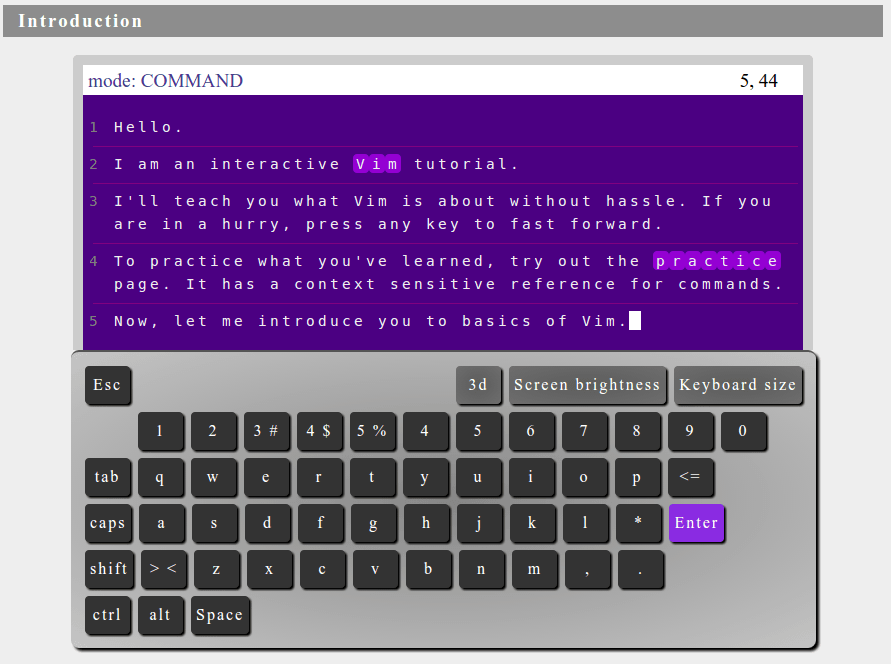Bits of Linux: 2015 #11
In this edition: Cory Doctorow on mass surveillance, Richard Stallman on malware in proprietary software, Ubuntu MATE review, an online tool for learning Vim, a collection of privacy tools and more.
📰 Articles / Videos
Cory Doctorow's Talk at re:publica 2015
In the beginning of May the re:publica conference took place in Berlin and Cory Doctorow from the Electronic Frontier Foundation gave this talk about the past, present and future of mass surveillance.
Cory, who is wearing a very tasteful shirt btw, points out that modern technology opens up possibilities for surveillance and manipulation that far exceed what was possible for spying agencies like the Stasi in the former GDR.
It's fascinating and scaring at the same time, how technology can be used and abused and what the so called Internet of Things has to offer for good and bad.
Richard Stallman on Malware
Richard Stallman wrote an article on malware, which he argues is not only about computer viruses. Malware is also present in a lot of proprietary software, computing for suckers as he calls it, for example in operating systems like Microsoft Windows:
What kinds of programs constitute malware? Operating systems, first of all. Windows snoops on users, shackles users and, on mobiles, censors apps; it also has a universal back door that allows Microsoft to remotely impose software changes. Microsoft sabotages Windows users by showing security holes to the NSA before fixing them.
While not everybody is free to choose the software to use every time, if the choice is up to you consider using a free and libre alternative to a proprietary system. If not for freedom, do it for the sake of your privacy.
Ubuntu MATE Distro Review
On to something more pleasant, InfinitelyGalactic reviewed Ubuntu MATE 15.04 in the video below. Having been a MATE user for the past two months, I'm not surprised that he finds nothing really bad about it and considers it a very exciting distribution. Apart from slight theme customizations, the only things I changed are not autostarting tilda, I prefer the MATE terminal, and not using the F12 key to toggle its visibility.
💬 Discussions / Q&A
Terminal 'incognito mode'?
Paranoid Panda asked whether there is something like an incognito mode when working with the terminal. An obvious use case is when you have to type a password in visible mode. You usually don't want it to end up in your shell history. You can avoid that by starting your command with a space, disable history temporarily or for the current session as well as some other methods stated in the answers.
💻 Linux Devices
I added specs for the following Chromebooks:
Regarding the focus on privacy in this Bits of Linux edition, I like to stress again, that as much as I like the Chrome browser, I would not use Chrome OS exclusively. Not only for lack of certain applications, but also to not getting locked in to the Google ecosystem completely. Thankfully, you can run other Linux distributions on Chromebooks without too much of a hassle.
📖 Open Source Projects / Resources
Collection of Privacy Tools
If you care about privacy, which you should, and still want to use technology you can do something for it. privacytools.io lists several programs like browsers and extensions, mail clients and messengers and documents application settings to make your online activities more of your own business and secure.
Online Tool for learning Vim
Knowing how to use an editor that runs from a command-line interface can't be a bad thing. Considering its wide availability and popularity Vim is a viable choice. If you like online tools and want to learn the basics of using Vim, check out openvim.coml and the source code behind it.

Free Book on Operating System development
The little book about OS development is a free online book written by Erik Helin, Adam Renberg. It is a practical guide to writing your own x86 operating system giving enough help with the technical details while not revealing too much with samples and code excerpts. The book source code is available on GitHub.
😎 Fun Stuff
That Strange Internet of Things
Apart from privacy and security concerns that go with so-called smart devices they can be pretty hilarious. We put a chip in it lists products that fall into the Internet of Things category questioning whether a dumb thing really becomes smart by putting a chip in it.
The smartphone controlled LED vest for your dog is just one of the inventions that seem to have been conceived under the influence. Maybe that is key to becoming backed.

Bash Fork Bomb T-Shirt White Print
How to create a fork bomb to crash a computer system? Use this cryptic bash command:
:(){ :|:& };:
A t-shirt with the code for a Bash fork bomb printed in a white monospace font.
Bits of Linux is a bi-weekly round-up of interesting articles, discussions, Q&A, open source software projects, new Linux devices and reviews as well as a dose of fun stuff related to Linux, that have been published or I have discovered during the past 2 weeks. To not miss posts in this series, subscribe to the Bits of Linux RSS feed.
To be informed of new posts, subscribe to the RSS feed or follow Linux Netbook on Facebook.
Affiliate Disclosure: External links on this website may contain affiliate IDs, which means that I earn a commission if visitors make a purchase via such a link. For details, see the disclosure page.
Related products

Acer 11.6-inch Chromebook Laptop 2GB 16GB | CB3-111-C8UB
Search Amazon
Acer Chromebook 15 CB5-571-C4T3 (15.6-Inch HD, 2GB RAM, 16GB SSD)
Search Amazon



